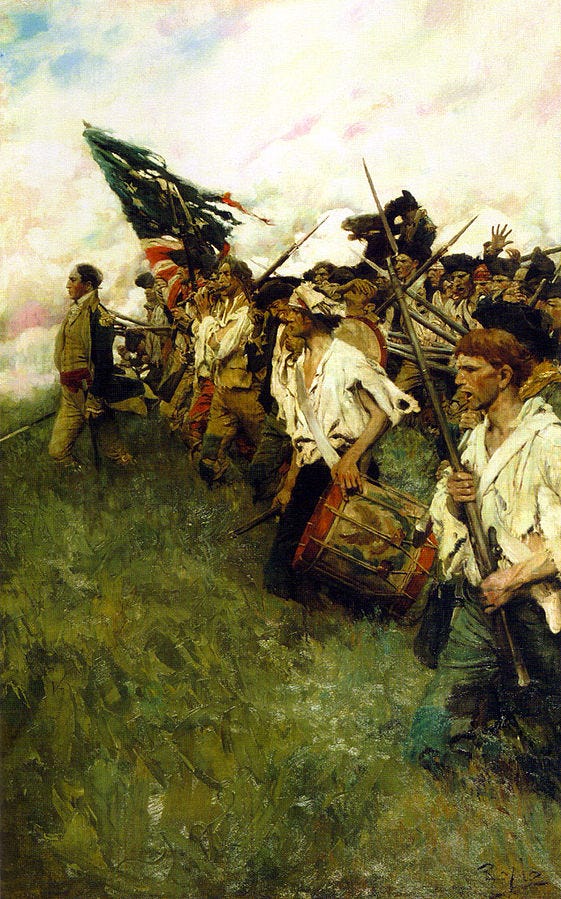TWIH: Battle of Brandywine
At what point do you think the British started to suspect that they’d underestimated us?
At about this time in 1777, George Washington’s army loses the Battle of Brandywine, yet the soldiers leave in good spirits. They’d put up a gallant fight, and the British had been left too tired and demotivated to maintain a pursuit.
Washington wrote John Hancock that despite “the misfortune of the day, I am happy to find the troops in good spirits; and I hope another time we shall compensate for the losses now sustained.”
General William Howe was then traveling toward Philadelphia. He had just clashed with Americans at the Battle of Cooch’s Bridge. It was a battle that left those Americans retreating back toward Washington’s main army.
The two sides prepared for the larger conflict that seemed certain to come.
Washington decided to make a stand at Brandywine Creek, a natural defense to the west of Philadelphia. The creek was swift-moving and difficult to cross, but there were a few known fords across the water. Washington stationed the bulk of his forces at one of these: Chadds Ford. He also sent forces under Major General John Sullivan and Major General John Armstrong to cover the fords to the north and south.
Unfortunately, Howe knew something that Washington did not.
Washington had been told that there were no fords within 12 miles of Sullivan’s outermost forces, but Howe knew of another ford on the northern side of the river. Howe decided to break up his forces. General Wilhelm von Knyphausen would lead 6,800 men at Chadds Ford. In the meantime, Howe would take his 8,200 men across the northern ford.
This was harder than it sounds. The Brandywine has a fork in it, so Howe’s men would actually end up crossing in two places, just to get to the other side. They would then come back south and surprise the Continental Army on its right flank.
The two sides clashed on the morning of September 11.
Knyphausen was to work his way towards Chadds Ford in the morning, but it was only a diversion. The real attack would come later, from the forces that Howe was leading across the northern ford. Americans met and held off Knyphausen’s men for a time, but they were eventually forced to fall back. Meanwhile, Washington was trying to assess whether Knyphausen’s attack was the main thrust of the British’s movements or if more was to come from another direction. He was receiving conflicting reports. One scout reported that he had “heard nothing of the Enemy about the Forks of the Brandywine & is Confident they are not in that Quarter,” but another reported that “5000, with 16 or 18 field pieces” had been sighted.
The uncertainty was removed when Sullivan’s forces were attacked at about 4 p.m. Americans fought hard. Sullivan later wrote that the “fire was Close & heavy for a Long time & Soon became General . . . five times did the Enemy drive our Troops from [Birmingham] Hill & as often was it Regained & the Summit often Disputed almost muzzle to muzzle.”
The British eventually obtained control of the hill. Americans retreated, but they did so in a surprisingly orderly fashion. They managed to regroup in Chester, Pennsylvania. The British, too, were exhausted and stopped to attend to their wounded, rather than keep up a pursuit of the American forces.
The battle was a loss. American casualties were numerous. And yet Americans had made a legitimate stand against a large and professional British army.
Hmm. At what point do you think the British started to suspect that they’d underestimated us?
Sources can always be found on my website, here.



Sometimes a loss can be a win. The fighting spirit was awakened and well as a result of the battle at Brandywine. Despite having lost the hill, the Americans gained morale and confidence which was invaluable to the outcome of the war. Thank you Tara.
Washington was indeed a capable general who rarely allowed his men to be cornered. His men were more experienced and had gained some confidence. They certainly had become a worthy opponent for the British although the British attitude of superiority certainly would not let them acknowledge the fact! Their concert would allow several different commanders to be led into traps by these supposedly inept colonials! And they emerged from Brandywine with more confidence! Thanks for this insightful peep into history, Tara Ross! May God continue to bless your efforts!